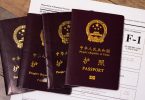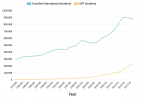By Yiyan Zheng
BU News Service
BOSTON — Ezgi Toper felt lucky to be one of the last people to go on the stage, seeing other storytellers as vulnerable exposing their personal stories to strangers. She told herself it was going to be ok. It would not matter if she stumbled or stuttered. What mattered was to get the story’s message across. She thought she would just look straight ahead the countdown clock in the auditorium, but she started to make eye contacts with some of the audience members. She let go of herself.
It turned out more than just ok.
In uproarious laughter, over 40 live audience members scored each storyteller after their 5-8 minute performance. It was Toper that won the Global Story Slam trophy in the end.
“This is one of the best evenings ever,” Toper said. “Some girl snapped at some point. That someone in the audience was like: ‘Yeah I agree with this!’ It meant so much to me.”
On the theme “Lost in Translation,” seven BU students, faculty and staff, including Toper, narrated their personal stories in front of a live audience at the second Annual Global Story Slam. Presented by BU Global Programs during International Education Week, from Nov. 12 to Nov.16, this featured event took place on Wednesday Nov. 14 in the Questrom School of Business Auditorium.
Instead of choosing one specific story, Toper walked through her life with four chapters, touting how the meaning of the phrase “Where are you from?” has changed on four continents where she has lived in. Born and raised in Johannesburg, South Africa, Toper moved to Perth, Australia, when she was 11. She returned to Ankara, Turkey and is currently living in the U.S., studying journalism and psychology in the College of Communication at BU as a senior student.
In South Africa, “Where are you from?” was the easiest question for Toper to answer. It was either the direction of her home or her family’s roots.
Once she moved to Australia, the concept of the phrase altered. To outsiders like her, the question meant “You don’t look like us. Where ARE you from?”
In Turkey, the place where her parents are from, Toper was bullied because she could not speak the language or even pronounce her name correctly. She picked up an American accent that she still uses. American accent is considered neutral and international, so she would not be judged again about where she was from.
When she came to America, five Uber drivers in five different locations all assumed she was from Venezuela and tried speaking Spanish with her. People could not categorize her skin color, so she adopted the word “olive” or “caramel” to describe herself, making things simpler for them. Rather than “Where are you from? You look so interesting”, Toper feels this phrase also points at “What are you? We can’t place you in a little checkbox and on a little form.”
“I want the audience not to box themselves into one category if that would be race, religion or nationality,” Toper said. “I want to make sure when we are asking each other the question of ‘where are you from’, that it is genuine and curious without judgment.”
Other stories included a Ugandan’s failed prank of April Fools in America, a clinical psychologist’s cross-continental journeys at different airports, a Texan traveling and waiting at the customs hall of Israel with his washed passport and so on.

Seven BU students, faculty and staff participated in the Global Story Slam, telling their personal stories in front of a live audience. Caleb Felder from Texas shared his story of traveling and waiting at the customs hall of Israel with his washed passport. Photo by Yiyan Zheng / BU News Service.
One of the storytellers, Shamaila Khan’s words resonated with most of the audience and other performers. A Pakistani-American and a muslim raised on three different continents, Khan is conversant in seven languages and currently works as an assistant professor at Boston University’s School of Medicine.
“Being in between spaces is familiar,” she said. “Never belonging, never fitting in, is familiar. Almost everywhere and yet nowhere is familiar. I learned, not [only] to speak a new language, but also to live in a second, third or fourth language. I learned to discover myself or parts of myself in each language. I do not feel lost in translation but rather found in it.”





